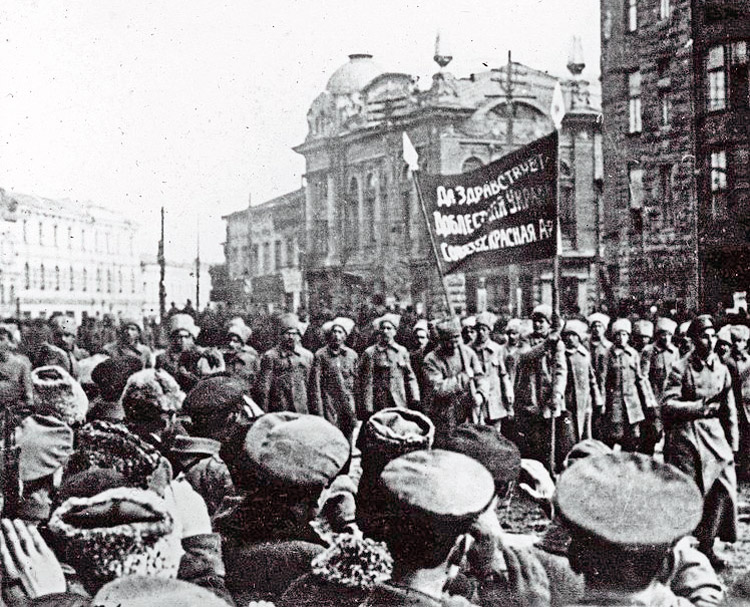Days before Russian President Vladimir Putin launched Moscow’s invasion of Ukraine in 2022, he denied the country really exists as an independent nation, claiming it was “an inalienable part” of Russia. He blamed V.I. Lenin, the central leader of the Bolshevik-led Russian Revolution, for backing the creation of Ukraine.
Putin is determined to reassert Moscow’s domination over countries once held within the vast empire of the Russian czars. The biggest obstacle to his goal is Ukrainian working people, who are the backbone of the fight to repel the invasion and to defend the country’s sovereignty. Their chief allies are among the Russian soldiers, their families and other working people, who face the bloody consequences of Putin’s war and his attempts to crush his political opponents at home.
The Socialist Workers Party supports the battle by Ukraine’s people against Moscow’s domination, consistent with the continuity of the communist movement and the example set by Lenin and the Bolsheviks, the vanguard of the world’s first socialist revolution.
Lenin led the fight before, during and after the 1917 Russian Revolution to support the right of self-determination to nations seeking to break free from the czarist prison house of nations, including Ukraine. Subsequently, this course, which led to the flowering of the Ukrainian language and culture, was overturned in a bloody counterrevolution led by Joseph Stalin. This drove working people from political power and restored Moscow’s domination over the nations freed from its grasp.
Under czarist rule, Ukrainians, Georgians, Jews, Tatars and millions from Central Asia to the Caucasus region were denied the basic right to use their native language, practice the religion of their choice and exercise control over their cultural, economic and political affairs.
The 1917 Russian Revolution changed all that, bringing tens of millions into social and political life for the first time. Lenin and the Bolsheviks led workers and peasants to take state power, nationalize the factories, land and banks and run them in the interests of the great majority.
Key to advancing the revolution was the new government’s championing of the right to self-determination of oppressed nationalities, within what had been the Russian Empire as well as worldwide.
Ukrainian Bolsheviks led in establishing an autonomous republic there that voluntarily joined the new Union of Soviet Socialist Republics.
Opposed Great Russian chauvinism
Even “the slightest manifestation in our midst of Great-Russian nationalism” had to be fought, Lenin explained, because it would prevent working people from fighting to “uphold the dictatorship of the proletariat and Soviet power in the fight against the landowners and capitalists of all countries and against their attempts to restore their domination.”
Toward the end of his active political life, Lenin waged a battle between 1922 and 1923 within the leadership of the Communist Party to try to preserve the alliance of workers and peasants that was at the heart of the revolution. He resisted the growing privileged government bureaucracy headed by Stalin.
Lenin fought to safeguard the voluntary character of the union of Soviet republics, which was threatened by Stalin’s proposals that would reinstate Moscow’s domination.
“Internationalism on the part of oppressors or ‘great’ nations,” Lenin wrote in 1922, “must consist not only in the observance of the formal equality of nations but even as an inequality, through which the oppressor nation, the great nation, would compensate for the inequality which obtains in real life.”
Stalin’s victory and the police-state regime he led put an end to Lenin’s communist course. In Ukraine, tens of thousands of revolutionary militants were executed or sent to labor camps. Leon Trotsky, the Bolshevik leader who led the fight to continue Lenin’s course, was exiled and later assassinated by Stalin’s secret police as World War II began.
The Stalinist regime took special vengeance against the workers and farmers of Ukraine. It systematically killed thousands of Ukrainian writers, artists, intellectuals and political officials.
Millions more were starved to death when Stalin forcibly requisitioned all grain in Ukraine to sell abroad, giving rise to the Holodomor in 1932-33, which literally means killing by hunger. Stalin’s forced collectivization of peasant land across the Soviet Union fell with special force in Ukraine.
“Nowhere did restrictions, purges, repressions and in general all forms of bureaucratic hooliganism assume such murderous sweep as they did in the Ukraine in the struggle against the powerful, deeply rooted longings of the Ukrainian masses for greater freedom and independence,” Trotsky wrote in 1939.
Moscow’s rule over Ukraine and other oppressed nations continued under subsequent Stalinist regimes until the Soviet Union disintegrated in 1991. Afterward, Ukraine and 13 other former republics declared independence.
The Socialist Workers Party gives unconditional support to the Ukrainian toilers’ fight to defend their sovereignty.
Today, Putin insists Stalin was right against Lenin.
His regime’s war to conquer Ukraine has accelerated the threat of more military conflicts as rival capitalist powers worldwide look to rearm and seek new alliances to protect their interests.
The stakes have heightened for workers worldwide to chart a road to take political power from the capitalist classes into our own hands, as the workers in Russia did in 1917.


